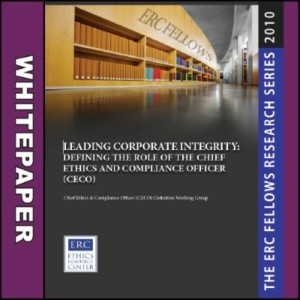Senior corporate executives are under great pressure to build and maintain strong organizational ethics programs. The stakes are high for any organization that fails to make ethics a priority and then finds itself embroiled in scandal. Public perceptions?often driven by the media?spoil a company?s reputation and weaken its brand value. Lowered trust among investors can devastate a company?s ability to attract support for growth. Regulators and lawmakers may move swiftly to punish and/or further regulate those who step outside accepted ethical boundaries. Today, many organizations are choosing to consolidate the critical responsibility for ethics and compliance programs under a chief ethics and compliance officer (CECO). But the specific roles and reporting lines for this relative newcomer among corporate management positions are not always clearly defined; many CECOs report feeling set up for failure due to insufficient authority or inadequate resources. This paper is intended to serve as the starting point for a dialogue within corporate management circles? particularly among CEOs, boards of directors and the CECOs themselves?about the proper placement, qualifications, and responsibilities for a leader of the corporate ethics and compliance function.
